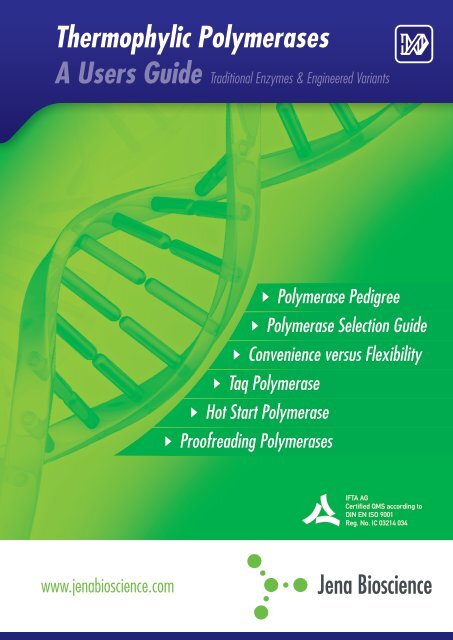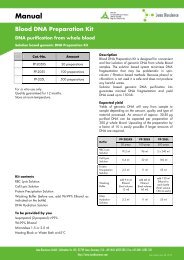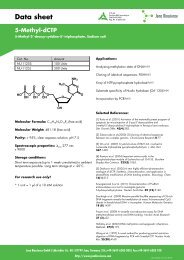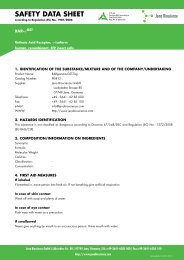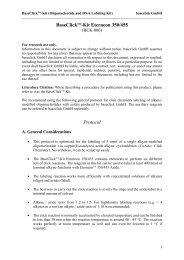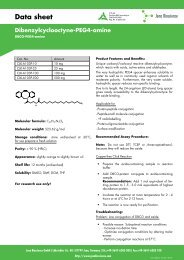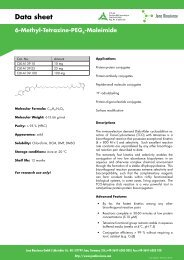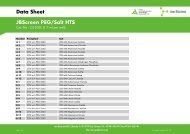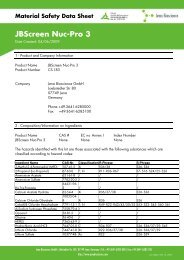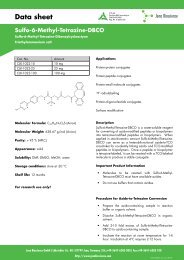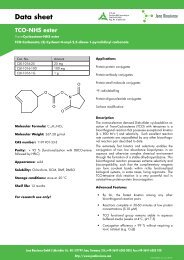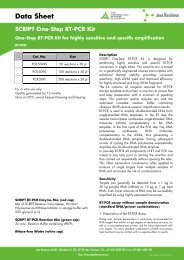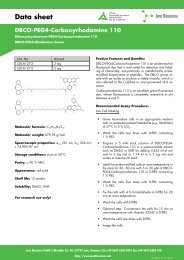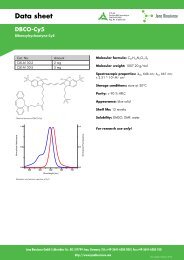Polymerase Guide - Jena Bioscience
Polymerase Guide - Jena Bioscience
Polymerase Guide - Jena Bioscience
You also want an ePaper? Increase the reach of your titles
YUMPU automatically turns print PDFs into web optimized ePapers that Google loves.
Thermophylic <strong>Polymerase</strong>s<br />
A Users <strong>Guide</strong><br />
www.jenabioscience.com<br />
Traditional Enzymes & Engineered Variants<br />
<strong>Polymerase</strong> Pedigree<br />
<strong>Polymerase</strong> Selection <strong>Guide</strong><br />
Convenience versus Flexibility<br />
Taq <strong>Polymerase</strong><br />
Hot Start <strong>Polymerase</strong><br />
Proofreading <strong>Polymerase</strong>s
<strong>Jena</strong> <strong>Bioscience</strong> GmbH was founded in 1998 by a team of scientists from the Max-Planck-Institute for Molecular Physiology in<br />
Dortmund. 25+ years of academic know how were condensed into the company in order to develop innovative reagents and<br />
technologies for the life science market.<br />
Since the start up, the company has evolved into an established global reagent supplier with more than 5500 products on stock<br />
and > 3000 customers in 50+ countries. <strong>Jena</strong> <strong>Bioscience</strong> serves three major client groups:<br />
■ ■ Research laboratories at universities, industry, government, hospitals and medical schools<br />
■ ■ Pharmaceutical industry in the process from lead discovery through to pre-clinical stages<br />
■ ■ Laboratory & diagnostic reagent kit producers and re-sellers<br />
Our company premises are located in the city of <strong>Jena</strong> / Germany with a subsidiary in Teltow, in the vicinity of the German capital<br />
Berlin.<br />
<strong>Jena</strong> <strong>Bioscience</strong>’s products include nucleosides, nucleotides and their<br />
non-natural analogs, recombinant proteins & protein production systems,<br />
reagents for the crystallization of biological macromolecules and tailormade<br />
solutions for molecular biology and biochemistry.<br />
In our chemistry division, we have hundreds of natural and modified<br />
nucleotides available on stock. In addition, with our pre-made building<br />
blocks and in-house expertise we manufacture even the most exotic<br />
nucleotide analog from mg to kg scale.<br />
In the field of recombinant protein production, <strong>Jena</strong> <strong>Bioscience</strong> has<br />
developed its proprietary LEXSY technology. LEXSY (Leishmania Expression<br />
System) is based on a S1-classified unicellular organism that combines easy<br />
handling with a full eukaryotic protein folding and modification machinery<br />
including mammalian-like glycosylation. LEXSY is primarily used for the<br />
expression of proteins that are expressed at low yields or are inactive in the<br />
established systems, and expression levels of up to 500 mg/L of culture were<br />
achieved.<br />
Imprint<br />
Design and Layout by:<br />
timespin - Digital Communication GmbH<br />
Sophienstrasse 1, 07743 <strong>Jena</strong><br />
www.timespin.de<br />
Copyright:<br />
Please contact <strong>Jena</strong> <strong>Bioscience</strong> if you want to use texts and/or images in any format or media.<br />
For the crystallization of biological macromolecules – which is the bottleneck<br />
in determining the 3D-structure of most proteins – we offer reagents<br />
and tools for crystal screening, crystal optimization and phasing that can<br />
reduce the time for obtaining a high resolution protein structure from<br />
several years to a few days.<br />
Our specialized reagents are complemented with a large selection of<br />
products for any molecular biology & biochemistry laboratory such as kits<br />
for Standard PCR and Real-Time PCR, fluorescent probes, oligonucleotides,<br />
cloning enzymes, mutagenesis technologies, and many more…<br />
We combine highest quality standards for all our products (certified according<br />
to DIN EN ISO 9001) with individualized customer support. We establish direct<br />
lines of communication from clients to our in-house scientists, resulting in<br />
productive interactions among people with similar research interests who<br />
speak the same language. Furthermore, we offer support programs and<br />
attractive discount schemes for young scientists establishing their own<br />
labs. If you wish to receive more information, just send an e-mail to<br />
info@jenabioscience.com.
Table of Contents<br />
<strong>Polymerase</strong> Pedigree 4<br />
<strong>Polymerase</strong> Selection <strong>Guide</strong> 5<br />
Convenience versus Flexibility 6<br />
Taq <strong>Polymerase</strong> 7<br />
PCR Enhancers and High Yield Buffer system 23<br />
Hot Start <strong>Polymerase</strong> 12<br />
Proofreading <strong>Polymerase</strong>s 14<br />
High Fidelity <strong>Polymerase</strong>s 15<br />
Pfu-X <strong>Polymerase</strong> 16<br />
Quality Control 17
4<br />
<strong>Polymerase</strong> Pedigree<br />
<strong>Polymerase</strong> Pedigree<br />
Thermostable DNA polymerases are heat-resistant, template-dependent<br />
enzymes that add free nucleotides to the 3'-end of a newly synthesized<br />
complementary DNA strand. They can be divided into proofreading<br />
enzymes (with inherent 3’-5’ exonuclease activity) and non-proofreading<br />
enzymes that lack exonuclease activity. 3’-5’ exonuclease activity occurs<br />
Non-proofreading<br />
Thermostable DNA<br />
<strong>Polymerase</strong>s<br />
5’→■3’ polymerization<br />
Blends<br />
Proofreading<br />
3’→■5’ exonuclease<br />
Wild Type Engineered Wild Type Wild Type Engineered<br />
■■ Taq <strong>Polymerase</strong><br />
■■ Taq Hot Start<br />
<strong>Polymerase</strong><br />
■■ Tth <strong>Polymerase</strong><br />
■ ■ Sequencing<br />
<strong>Polymerase</strong> (Taq<br />
Δ1-272, F667Y)<br />
■■ Taq 5’→3’ exo- <strong>Polymerase</strong><br />
(Taq G46D)<br />
■■ High Fidelity<br />
<strong>Polymerase</strong><br />
■■ High Fidelity<br />
Hot Start<br />
<strong>Polymerase</strong><br />
upon incorporation of a mismatched base: The polymerase reverses its<br />
direction by one base pair, excises the mismatch, re-inserts the correct base<br />
and continues replication. DNA polymerases are commercialized in various<br />
forms including engineered mutants and blends of polymerases to achieve<br />
optimal results in a large variety of DNA synthesis reactions (Fig. 1).<br />
■■ Pfu <strong>Polymerase</strong><br />
■■ Pfu Hot Start<br />
<strong>Polymerase</strong><br />
■■ Pwo <strong>Polymerase</strong><br />
■■ Tli <strong>Polymerase</strong><br />
Taq: Thermus aquaticus, Tth: Thermus thermophilus, Pwo: Pyrococcus woesei, Pfu: Pyrococcus furiosus, Tli: Thermococcus litoralis.<br />
Enzymes available from <strong>Jena</strong> <strong>Bioscience</strong><br />
■■ Pfu-X<br />
<strong>Polymerase</strong><br />
(increased fidelity<br />
and processivity)<br />
Figure 1<br />
Proofreading and non-proofreading enzymes are marketed as wild type, engineered mutants, and blends thereof covering a very broad<br />
range of applications.
www.jenabioscience.com <strong>Polymerase</strong> Selection <strong>Guide</strong> – What enzyme do I need?<br />
<strong>Polymerase</strong> Selection <strong>Guide</strong> – What enzyme do I need?<br />
The available portfolio of our polymerases (Fig. 1) allows choosing the most<br />
appropriate enzyme for a particular application. In most cases it is desired<br />
that a PCR yields large amounts of DNA with high specificity (no by-product<br />
DNA) and high fidelity (minimum number of mutations).<br />
Table 1<br />
Selection guide for choosing the most appropriate polymerase.<br />
Enzyme<br />
Efficiency /<br />
Yield<br />
Specificity<br />
Fidelity /<br />
Error rate<br />
[1], [2]<br />
Taq <strong>Polymerase</strong> ++ ++ 10 -5<br />
Taq <strong>Polymerase</strong> / high<br />
yield<br />
Taq Hot Start<br />
<strong>Polymerase</strong><br />
+++ + 10 -5<br />
++ +++ 10 -5<br />
High Fidelity <strong>Polymerase</strong> +++ ++ 2 × 10 -6<br />
High Fidelity Hot Start<br />
<strong>Polymerase</strong><br />
+++ +++ 2 × 10 -6<br />
Pfu-X <strong>Polymerase</strong> +++ +++ 2 × 10 -7<br />
Application<br />
References:<br />
[1] The error rate of a polymerase is calculated as number of mutations per number of base pairs per DNA doublings (PCR cycles).<br />
ER = MF / (bp · d)<br />
ER: Error rate<br />
MF: number of mutations (mutation frequency)<br />
bp: number of base pairs (fragment length)<br />
d: DNA doublings (number of PCR cycles)<br />
[2] <strong>Jena</strong> <strong>Bioscience</strong>, 2011<br />
Since these requirements sometimes may be contradictory – and also<br />
depend on the buffer system and the cycling regime – <strong>Jena</strong> <strong>Bioscience</strong><br />
offers the polymerases Taq Pol & Taq Pol / high yield, Taq Hot Start & High<br />
Fidelity Hot Start, High Fidelity, and Pfu-X that cover the entire range of<br />
applications (Tab. 1).<br />
■■ Standard PCR / optimized for minimal by-product formation<br />
■■ Routine and plate based PCR, automated pipetting<br />
■■ Standard PCR / optimized for high efficiency in a broad range of<br />
reaction conditions<br />
■■ Incorporation of modified nucleotides<br />
■■ High specificity PCR / high sensitivity PCR<br />
■■ Plate based PCR and automated pipetting<br />
■■ High fidelity PCR / long range PCR ( > 30 kb)<br />
■■ Amplification of GC-rich and other difficult templates<br />
■■ High fidelity PCR with highest specificity and sensitivity<br />
■■ Long range PCR, amplification of difficult templates and of<br />
small template amounts<br />
■■ Amplification with highest fidelity<br />
■■ High speed amplification of difficult and long templates<br />
5
6<br />
Convenience versus Flexibility<br />
Convenience versus Flexibility<br />
A PCR reaction requires DNA-template, primers, dNTPs, and DNA polymerase<br />
in an appropriate buffer. All these components may be set up individually<br />
which allows high flexibility but – on the other hand – requires inconvenient<br />
Convenience<br />
Ready-to-Use Lyophilisates<br />
■■ complete ready-to-use mixes in a dry, room temperature stable format<br />
■■ no need for freezing, thawing or pipetting on ice<br />
■■ delivered in preloaded PCR tube strips or 96-well plates<br />
■■ few remaining pipetting steps minimize risk of errors or contaminations -<br />
vials are simply filled up with template, primer, and PCR-grade water<br />
Ready-to-Use Mixes / direct gel loading<br />
■■ contain an inert, PCR-compatible dye for direct loading of the crude<br />
PCR reaction onto a gel<br />
■■ contain all reagents required for PCR (except template and primer)<br />
in a premixed 5 x concentrated ready-to-use solution<br />
Ready-to-Use Mixes<br />
■■ contain all reagents required for PCR (except template and primers)<br />
in a premixed 5 x concentrated ready-to-use solution<br />
■■ reduce number of pipetting steps compared to Core Kits<br />
Core Kits<br />
■■ polymerase, ultrapure dNTPs and optimized reaction buffer<br />
in separate vials<br />
■■ additional MgCl stock solution allowing optimization of Magnesium-<br />
2<br />
sensitive PCR reactions<br />
■■ ensures superior performance due to fine-tuned combination of<br />
polymerase and dNTPs<br />
<strong>Polymerase</strong> Kits<br />
■■ choice of polymerase (Taq, Hot Start or proofreading enzyme) and<br />
optimized reaction buffer in separate vials<br />
■■ additional MgCl stock solution allowing optimization of Magnesium-<br />
2<br />
sensitive PCR reactions<br />
multiple pipetting steps. In order to allow the user to compromise between<br />
convenience and flexibility, <strong>Jena</strong> <strong>Bioscience</strong> offers its polymerases in five<br />
types of formulations (Fig. 2).<br />
Figure 2<br />
Five types of formulation ranging from ready-to-use room-temperature-stable lyophilisates and mastermixes (that require<br />
a minimum of pipetting) to polymerase kits that allow adaptation for any PCR. Lyophilisates and Ready-to-Use Mixes with<br />
primers are available upon request.<br />
Flexibility
www.jenabioscience.com Taq <strong>Polymerase</strong><br />
Taq <strong>Polymerase</strong><br />
Taq polymerase is the traditional work horse for PCR. Our enzyme is<br />
the product of the wild type Thermus aquaticus DNA polymerase gene<br />
expressed in E. coli. Each lot of our Taq polymerase is subjected to a set of<br />
quality control assays, including a low copy 4 kb PCR (Fig. 3), a qPCR-based<br />
contamination test for bacterial and human DNA (Fig. 10), a FRET assay to<br />
verify absence of contamination with DNases, RNases and nicking enzymes,<br />
and a colorimetric assay to test for proteolytic activities.<br />
500 bp<br />
DNA<br />
Ladder<br />
Taq Pol Competitor I Competitor II<br />
<strong>Jena</strong> <strong>Bioscience</strong><br />
Cat.-No. PCR-202<br />
100 pg 50 pg 20 pg 10 pg<br />
100 pg 50 pg 20 pg 10 pg 100 pg 50 pg 20 pg 10 pg<br />
Taq polymerase comes with complete optimized reaction buffer (including<br />
MgCl 2 ) and with additional buffer (without magnesium but with a separate<br />
vial of MgCl 2 ) allowing optimization of Mg 2+ -concentration for individual<br />
assays [3], [4], [5].<br />
The enzyme works for most PCR reactions and primer-template combinations<br />
without the need for optimization. The very robust enzyme-buffer system is<br />
particularly suitable for plate based PCR and automated pipetting.<br />
500 bp<br />
DNA<br />
Ladder<br />
Figure 3<br />
One important parameter that separates high-quality polymerases from others is amplification of long fragments from minimum amounts of<br />
template. The gel shows <strong>Jena</strong> <strong>Bioscience</strong>’s Taq Pol routine QC assay – amplifying a 4 kb fragment from lambda DNA in a dilution series from 100 pg<br />
down to 10 pg of template – compared to other Taq polymerases. Its high amplification efficiency – especially at lowest template amounts – and<br />
minimal formation of by-products distinguish Taq Pol from competitor enzymes. Assay: Amplification of lambda DNA (template dilution series),<br />
4 kb fragment, 1.25 units Taq Pol / reaction. 95°C, 2 min; 30x (95°C, 10 s; 61°C, 20 s; 72°C, 4 min); 72°C, 4 min.<br />
References:<br />
[3] Mullis et al. (1987) Specific synthesis of DNA in vitro via a polymerase-catalyzed chain reaction. Methods in Enzymol. 155:335.<br />
[4] Saiki et al. (1985) Enzymatic amplification of beta-globin genomic sequences and restriction site analysis for diagnostics of sickle cell anemia. Science. 230:1350.<br />
[5] Gelfand (1992) Taq DNA <strong>Polymerase</strong>. In: PCR Technology (Erlich). Oxford University Press, New York. 17.<br />
7
8<br />
Taq <strong>Polymerase</strong><br />
Apart from the ability of Taq polymerase to amplify low amounts of<br />
template, the speed of amplification is an important criterion when using<br />
a polymerase since it greatly affects the overall running time of the PCR.<br />
Specialized mutant enzymes with increased processivity polymerize up to<br />
several thousands of nucleotides per minute while common wild type Taq<br />
100 bp<br />
DNA<br />
Ladder<br />
1 min elongation time<br />
1.0 kb 1.5 kb 2.0 kb 2.5 kb 3.0 kb 3.5 kb 4.0 kb<br />
100 bp<br />
DNA<br />
Ladder<br />
polymerase preparations are considered to form approximately 1.000 new<br />
base pairs per minute.<br />
The <strong>Jena</strong> <strong>Bioscience</strong> Taq polymerase was systematically investigated for its<br />
processivity, and all lots released allow amplification of up to 3 kb of DNA per<br />
minute without significant loss of yield (Fig. 4).<br />
Figure 4<br />
<strong>Jena</strong> <strong>Bioscience</strong> Taq Pol is capable of incorporating up to 3 kb per min without significant loss of yield. Assay: Amplification of lambda DNA,<br />
100 pg, various fragment lengths, 1.25 units Taq Pol / reaction, 95°C, 2 min; 30 x (95°C, 10 s; 59°C, 20 s; 72°C, 1 min); 72°C, 1 min.<br />
In addition, the polymerase’s thermostability is an important parameter.<br />
During a conventional PCR the temperature exposure accumulates to<br />
roughly 10-15 min at 95°C and additional 30-60 min at 72°C. This significant<br />
500 bp<br />
DNA<br />
Ladder<br />
500 bp<br />
DNA<br />
Ladder<br />
500 bp<br />
DNA<br />
Ladder<br />
without pre-incubation pre-incubation<br />
pre-incubation<br />
100 pg 50 pg 20 pg 10 pg<br />
30 min @ 95°C<br />
120 min @ 95°C<br />
100 pg 50 pg 20 pg 10 pg 100 pg 50 pg 20 pg 10 pg<br />
heat stress can only be withstood by high quality enzyme preparations. The<br />
thermostability of <strong>Jena</strong> <strong>Bioscience</strong> Taq Pol is shown in Fig. 5. The enzyme is<br />
stable at 95°C for up to 30 min without significant loss of activity.<br />
Figure 5<br />
Exposure of <strong>Jena</strong> <strong>Bioscience</strong> Taq Pol to heat stress (30 min @ 95°C) results in a minor decrease of activity only and thereby ensures functionality of<br />
the enzyme even for prolonged PCR programs. Significant decrease of activity is only observed after excessive heat stress (120 min @ 95°C) which is<br />
way beyond the requirements in PCR. Assay: Amplification of lambda DNA (template dilution series), 4 kb fragment, 1.25 units Taq Pol / reaction, 95°C,<br />
0 / 30 / 120 min; 95°C, 2 min; 30x (95°C, 10 s; 61°C, 20 s; 72°C, 4 min); 72°C, 4 min.<br />
500 bp<br />
DNA<br />
Ladder
www.jenabioscience.com Taq <strong>Polymerase</strong><br />
<strong>Jena</strong> <strong>Bioscience</strong> Taq polymerase comes in five formulations ranging from lyophilized, room temperature stable beads<br />
in preloaded PCR tubes over convenient and cost-effective mastermixes and core kits to individual Taq Pol for flexible<br />
adaption to customized assays (Tab. 2).<br />
Table 2<br />
Summary of <strong>Jena</strong> <strong>Bioscience</strong> Taq Pol formulations.<br />
Lyophilisate Price EUR<br />
Taq Master Lyophilisate<br />
Ready-to-Use Mix / direct gel loading<br />
Red Load Taq Master<br />
Ready-to-Use Mix<br />
Taq Master<br />
Core Kit<br />
Taq Core Kit<br />
<strong>Polymerase</strong> Kit<br />
Taq Pol<br />
preloaded 8-tube strips or<br />
96-well plates,<br />
PCR-grade water<br />
5x conc. Mastermix,<br />
PCR-grade water<br />
5x conc. Mastermix,<br />
PCR-grade water<br />
Taq Pol, dNTP Mix,<br />
Reaction Buffer complete,<br />
Reaction Buffer without MgCl 2 ,<br />
MgCl 2 stock solution<br />
Taq Pol,<br />
Reaction Buffer complete,<br />
Reaction Buffer without MgCl 2 ,<br />
MgCl 2 stock solution<br />
S pack PCR-152S-8TS<br />
L pack PCR-152S-8TL<br />
12 strips<br />
(96 reactions)<br />
60 strips<br />
(480 reactions)<br />
90,–<br />
360,–<br />
S pack PCR-108S 100 reactions 45,–<br />
L pack PCR-108L 500 reactions 180,–<br />
S pack PCR-102S 100 reactions 40,–<br />
L pack PCR-102L 500 reactions 160,–<br />
S pack PCR-232S 200 units 48,–<br />
L pack PCR-232L 1,000 units 192,–<br />
S pack PCR-202S 200 units 35,–<br />
L pack PCR-202L 1,000 units 140,–<br />
9
10<br />
Taq <strong>Polymerase</strong><br />
PCR Enhancers and High Yield Buffer system<br />
Alongside the pivotal ingredients of PCR – template, primers, polymerase,<br />
and dNTPs – a variety of additives has been identified that shows strong<br />
effects upon yield, specificity and consistency of PCR (Tab. 3). Each of<br />
these may have a beneficial effect on individual amplifications but it is still<br />
Table 3<br />
Selected additives known to affect PCR.<br />
Enhancer Recommended concentration References<br />
DMSO (dimethyl sulfoxide) 2 – 10 % [6], [7], [8]<br />
Betaine 1 – 1.5 M [9], [10], [11], [12]<br />
Formamide 1 – 5 % [13]<br />
Non-ionic detergents<br />
(e.g. Triton X-100, Tween 20 or Nonidet P-40)<br />
0.1 – 1 % [14], [15]<br />
TMAC (tetramethylammonium chloride) 15 – 100 mM [16], [17]<br />
7-deaza-2'-deoxyguanosine<br />
(dC 7 GTP)<br />
largely impossible to predict their effects a priori. Therefore, an individual<br />
assay optimization may be essential for cumbersome template-primer<br />
combinations.<br />
3:1<br />
(dC 7 GTP : dGTP)<br />
BSA (bovine serum albumin) 0.1 – 0.5 µg/µl [19], [20], [21]<br />
SSB (single-stranded DNA binding protein) 0.2 – 5 ng/µl [22], [23]<br />
References:<br />
[6] Smith et al. (1990) Using cosolvents to enhance PCR amplification. Amplifications 5:16.<br />
[7] Kulandaiappan et al. (1994) Denaturants or cosolvents improve the specificity of PCR amplification of a G+C-rich DNA using genetically engineered DNA polymerases. Gene 140:1.<br />
[8] Hung et al. (1990) A specificity enhancer for polymerase chain reaction. Nucleic Acids Research 18:1666.<br />
[9] Rees et al. (1993) Betaine can eliminate the base pair composition dependence of DNA melting. Biochemistry 32: 137.<br />
[10] Weissensteiner et al. (1996) Strategy for Controlling Preferential Amplification and Avoiding False Negatives in PCR Typing. BioTechniques 21: 1102.<br />
[11] Baskaran et al. (1996) Uniform amplification of a mixture of deoxyribonucleic acids with varying GC content. Genome Research 6: 633.<br />
[12] Henke et al. (1997) Betaine Improves the PCR Amplification of GC-Rich DNA Sequences. Nucleic Acids Research 25: 3957.<br />
[13] Sarkar et al. (1990) Formamide can dramatically improve the specificity of PCR. Nucleic Acids Research 18: 7465.<br />
[14] Demeke et al. (1992) The Effects of Plant Polysaccharides and Buffer Additives on PCR. Bio Techniques 12: 332.<br />
[15] Bachmann et al. (1990) Improvement of PCR amplified DNA sequencing with the aid of detergents. Nucleic Acids Research 18: 1309.<br />
[16] Hung et al. (1990) A specificity enhancer for polymerase chain reaction. Nucleic Acids Research 18: 4953.<br />
[17] Chevet et al. (1995) Low concentrations of tetramethylammonium chloride increase yield and specificity of PCR. Nucleic Acids Research 23: 3343.<br />
[18] McConlogue, L. et al. (1988) Structure-independent DNA amplification by PCR using 7-deaza-2'-deoxyguanosine. Nucl. Acids Res. 16(20): 9869.<br />
[19] Kreader et al. (1996) Relief of amplification inhibition in PCR with bovine serum albumin or T4 gene 32 protein. Applied and environmental microbiology 62: 1102.<br />
[20] Henegariu et al. (1997) Multiplex PCR: Critical Parameters and Step-by-Step Protocol. Bio Techniques 23: 504.<br />
[21] Giambernardi et al. (1998) Bovine Serum Albumin Reverses Inhibition of RT-PCR by Melanin. Bio Techniques 25:564.<br />
[22] Schwarz et al. (1990) Improved yields of long PCR products using gene 32 protein. Nucleic Acids Research 18: 1079.<br />
[23] Barski et al. (1996) Rapid assay for detection of methicillin-resistant Staphylococcus aureus using multiplex PCR. Mol Cell Probes 10: 471.<br />
[18]
www.jenabioscience.com Taq <strong>Polymerase</strong><br />
In order to avoid such tedious optimizations, we developed High Yield<br />
Buffer that contains a balanced composition of PCR enhancers for maximum<br />
efficiency. High Yield Buffer decreases the melting temperature of dsDNA<br />
and primer/ssDNA complexes and thus achieves superior amplification<br />
results especially for difficult template-primer combinations. It also facilitates<br />
Taq Pol Taq Pol / High Yield Buffer 200 bp<br />
DNA<br />
100 pg 50 pg 20 pg 10 pg 100 pg 50 pg 20 pg 10 pg<br />
Ladder<br />
Figure 6<br />
High Yield Buffer yields 3-10fold more PCR product compared to the conventional Taq Pol buffer system, but in difficult assay set-ups the<br />
increased yield may come at the cost of reduced specificity. Assay: Amplification of lambda DNA (template dilution series), 1 kb fragment,<br />
1.25 units Taq Pol / reaction, 95°C, 2 min; 30 x (95°C, 10 sec; 59°C, 20 sec; 72°C, 1 min); 72°C, 1 min.<br />
All Taq Pol formulations (Tab. 2) are alternatively available with High Yield Buffer at no additional costs.<br />
incorporation of labeled/modified nucleotides into the newly synthesized<br />
DNA strand. However, in complex assays the increased yield may come at<br />
the cost of reduced specificity, i.e. formation of unspecific DNA by-products.<br />
Taq Pol / High Yield Buffer is recommended for applications that require high<br />
yields (Fig. 6) and for PCR-mediated DNA labeling.<br />
11
12<br />
Hot Start <strong>Polymerase</strong><br />
Hot Start <strong>Polymerase</strong><br />
Our Hot Start polymerase is Taq Pol with inhibited enzymatic activity<br />
at ambient temperatures. This inactivation prevents extension of nonspecifically<br />
annealed primers and primer-dimers during PCR setup [24], [25],<br />
[26], [27], [28] and results in decreased formation of undesired by-products.<br />
During the initial denaturation step of the cycling program the inhibitor<br />
quickly dissociates and the polymerase becomes fully active.<br />
Hot Start Pol thus provides improved sensitivity and specificity when<br />
prolonged room-temperature exposure during PCR set up is inevitable and/<br />
Hot Start Pol<br />
Cat.-No. PCR-203<br />
0.5% 0.1% no<br />
GMO GMO GMO<br />
200 bp<br />
DNA<br />
Ladder<br />
Taq Pol<br />
Cat.-No. PCR-202<br />
0.5% 0.1% no<br />
GMO GMO GMO<br />
< signal<br />
< by-product<br />
or when low-copy-number templates are amplified from a complex matrix.<br />
This was analyzed for detection of genetically engineered soy in a soybean<br />
flour matrix using Taq Pol and Hot Start Pol. While both polymerases<br />
generate the characteristic signal, the formation of undesired non-specific<br />
by-product DNA is greatly reduced by Hot Start Pol (Fig. 7).<br />
In addition, every production lot of our Hot Start Pol is analyzed for<br />
amplification of a 345 bp fragment of the Insulin receptor gene from low<br />
amounts of human genomic DNA (Fig. 8).<br />
Figure 7<br />
Detection of genetically modified Roundup Ready® soy (Monsanto) down to 0.1% in soybean flour was compared for Hot Start Pol and<br />
conventional Taq Pol. Formation of by-product and associated risk of false positive detection is greatly reduced by Hot Start Pol.<br />
Assay: Amplification of genomic DNA, 210 bp fragment of soy transgene, 150 ng DNA / reaction, 1.25 units Hot Start Pol / reaction, 95°C, 2 min;<br />
35x (95°C, 30 sec; 56°C, 30 sec; 72°C, 30 sec); 72°C, 4 min.<br />
References:<br />
[24] Birch et al. (1996) Simplified hot start PCR. Nature 381: 445.<br />
[25] Agüero et al. (2003) Highly sensitive PCR assay for routine diagnosis of African swine fever virus in clinical samples. J Clin Microbiol. 41: 4431.<br />
[26] Ailenberg et al. (2000) Controlled hot start and improved specificity in carrying out PCR utilizing touch-up and loop incorporated primers (TULIPS). Biotechniques. 29: 1018.<br />
[27] Chou et al. (1992) Prevention of pre-PCR mis-priming and primer dimerization improves low-copy-number amplifications. Nucleic Acids Res. 20: 1717.<br />
[28] Kellogg et al. (1994) TaqStart Antibody: "hot start" PCR facilitated by a neutralizing monoclonal antibody directed against Taq DNA polymerase. Biotechniques. 16: 1134.
www.jenabioscience.com Hot Start <strong>Polymerase</strong><br />
100 bp<br />
DNA<br />
Ladder<br />
<strong>Jena</strong> <strong>Bioscience</strong> Hot Start Pol comes in five formulations ranging from lyophilized, room temperature stable beads in preloaded PCR tubes over convenient<br />
and cost-effective mastermixes and core kits to individual Taq Pol for flexible adaption to customized assays (Tab. 4).<br />
Table 4<br />
Summary of <strong>Jena</strong> <strong>Bioscience</strong> Hot Start polymerase formulations.<br />
Lyophilisate Price EUR<br />
Hot Start Master Lyophilisate<br />
preloaded 8-tube strips or<br />
96-well plates,<br />
PCR-grade-water<br />
Ready-to-Use Mix / direct gel loading<br />
5x conc. Mastermix,<br />
Red Load Hot Start Master<br />
PCR-grade water<br />
Ready-to-Use Mix<br />
Hot Start Master<br />
Core Kit<br />
Hot Start Core Kit<br />
<strong>Polymerase</strong> Kit<br />
Hot Start Pol<br />
Hot Start Pol<br />
Hot Start Pol<br />
Lot 110.865<br />
Lot 110.769<br />
100 pg 50 pg 20 pg 10 pg 100 pg 50 pg 20 pg 10 pg<br />
5x conc. Mastermix,<br />
PCR-grade water<br />
Hot Start Pol, dNTP Mix,<br />
Reaction Buffer complete,<br />
Reaction Buffer without MgCl 2 ,<br />
MgCl 2 stock solution<br />
Hot Start Pol,<br />
Reaction Buffer complete,<br />
Reaction Buffer without MgCl 2 ,<br />
MgCl 2 stock solution<br />
Hot Start <strong>Polymerase</strong><br />
Competitor<br />
100 pg 50 pg 20 pg 10 pg<br />
100 bp<br />
DNA<br />
Ladder<br />
Figure 8<br />
Two production lots of <strong>Jena</strong> <strong>Bioscience</strong> Hot Start Pol and a hot start enzyme from a competitor were assayed for amplification of a 345 bp fragment<br />
of the Insulin receptor gene from human genomic DNA in a template dilution series. Our Hot Start Pol yields a reproducible signal down to 10 pg<br />
of template corresponding to approximately 3 copies of human genomic DNA. Assay: Amplification of human genomic DNA, 345 bp fragment of<br />
Insulin receptor gene, 1.25 units Hot Start Pol / reaction, 95°C, 2 min; 35x (95°C, 10 sec; 50°C, 20 sec; 72°C, 1 min); 72°C, 1 min.<br />
S pack PCR-153S-8TS<br />
L pack PCR-153S-8TL<br />
12 strips<br />
(96 reactions)<br />
60 strips<br />
(480 reactions)<br />
120,–<br />
480,–<br />
S pack PCR-109S 100 reactions 90,–<br />
L pack PCR-109L 500 reactions 360,–<br />
S pack PCR-103S 100 reactions 80,–<br />
L pack PCR-103L 500 reactions 320,–<br />
S pack PCR-233S 200 units 83,–<br />
L pack PCR-233L 1,000 units 332,–<br />
S pack PCR-203S 200 units 70,–<br />
L pack PCR-203L 1,000 units 280,–<br />
13
14<br />
Proofreading <strong>Polymerase</strong>s<br />
Proofreading <strong>Polymerase</strong>s<br />
Proofreading polymerases (also see Fig. 1) are characterized by an inherent<br />
3’–5’ exonuclease activity that corrects mismatch errors during DNA<br />
replication and thereby greatly reduces the frequency of mutations.<br />
While Taq polymerase as typical non-proofreading enzyme incorporates<br />
approximately 1 mismatch per 10 4 –10 5 nucleotides, the fidelity of<br />
Table 5<br />
Fidelity (error rates) of <strong>Jena</strong> <strong>Bioscience</strong> polymerases.<br />
Enzyme<br />
Error Rate<br />
[36], [37]<br />
Fidelity compared to<br />
Taq <strong>Polymerase</strong><br />
Taq <strong>Polymerase</strong> / Hot Start <strong>Polymerase</strong> 10 -5 NA<br />
High Fidelity <strong>Polymerase</strong> / High Fidelity Hot Start<br />
<strong>Polymerase</strong><br />
proofreading enzymes is higher by a factor of 20–50 (Tab. 5) [29], [30], [31].<br />
Therefore, for a number of applications such as cloning, sequencing,<br />
amplification of long DNA fragments and mutational analyses the use of<br />
proofreading enzymes is highly recommended [32], [33], [34], [35].<br />
2 x 10 -6 5 x<br />
Pfu <strong>Polymerase</strong> 5 x 10 -7 20 x<br />
Pfu-X <strong>Polymerase</strong> 2 x 10 -7 50 x<br />
References:<br />
[29] Lundberg et al. (1991) High-fidelity amplification using a thermostable DNA polymerase isolated from Pyrococcus furiosus. Gene. 108: 1.<br />
[30] Tindall et al. (1988) Fidelity of DNA synthesis by the Thermus aquaticus DNA polymerase. Biochemistry. 27(16): 6008-13.<br />
[31] Cline et al. (1996) PCR Fidelity of Pfu DNA <strong>Polymerase</strong> and Other Thermostable DNA <strong>Polymerase</strong>s. Nucleic Acids Res. 24-18: 3546.<br />
[32] Barnes (1994) PCR amplification of up to 35-kb DNA with high fidelity and high yield from lambda bacteriophage templates. Proc Natl Acad Sci USA. 91: 2216.<br />
[33] Cheng et al. (1994) Effective amplification of long targets from cloned inserts and human genomic DNA. Proc. Natl. Acad. Sci. (USA) 91: 5695.<br />
[34] Cline et al. (1996) PCR fidelity of pfu DNA polymerase and other thermostable DNA polymerases. Nucleic Acids Res. 24: 3546.<br />
[35] Kim et al. (2008) Crystal structure of Pfu, the high fidelity DNA polymerase from Pyrococcus furiosus. Int J Biol Macromol. 42: 356.<br />
[36] ER = MF / (bp · d)<br />
ER: Error rate; MF: number of mutations (mutation frequency); bp: number of base pairs (fragment length);<br />
d: DNA doublings (number of PCR cycles)<br />
[37] in-house data
www.jenabioscience.com Proofreading <strong>Polymerase</strong>s<br />
High Fidelity <strong>Polymerase</strong>s<br />
High Fidelity <strong>Polymerase</strong> is a blend of Taq Pol with a proofreading enzyme<br />
in order to combine the speed of Taq polymerase with enhanced fidelity for<br />
highly accurate and efficient PCR. It shows excellent results with very long<br />
(30+ kb), GC-rich, and other “difficult” templates. A hot start version of High<br />
Fidelity Pol is also available and recommended when maximum specificity<br />
is additionally required.<br />
High Fidelity Pol<br />
High Fidelity Pol<br />
Lot 110.866<br />
Lot 110.866<br />
500 pg 200 pg 100 pg 50 pg 500 pg 200 pg 100 pg 50 pg<br />
λ DNA /<br />
Hind III<br />
DNA<br />
Ladder<br />
Figure 9<br />
Every production lot of High Fidelity polymerase is assayed for amplification of a dilution series of an 18 kb fragment down to 50 pg of template.<br />
Assay: Amplification of lambda DNA (template dilution series), 18 kb fragment, 1.25 units High Fidelity Pol / reaction, 95°C, 2 min; 20x (95°C,<br />
10 sec; 59°C, 20 sec; 68°C, 18 min).<br />
Table 6<br />
Formulations of High Fidelity Pol and High Fidelity Hot Start Pol.<br />
We have established a sensitive assay to evaluate performance of High<br />
Fidelity Pol that is based on amplification of a dilution series of an 18 kb<br />
template. The assay is very sensitive to even minor lot-to-lot variations, and<br />
every production lot is routinely tested for yielding a signal with as little as<br />
0.05 – 0.1 ng of template (Fig. 9).<br />
High Fidelity Pol and High Fidelity Hot Start Pol are available as core kits<br />
(including enzyme, dNTP mix and reaction buffer) and as single polymerase<br />
kits (enzyme and reaction buffer only, Tab. 6).<br />
Core Kits Price EUR<br />
High Fidelity Core Kit<br />
High Fidelity Hot Start Core Kit<br />
<strong>Polymerase</strong> Kits<br />
High Fidelity Pol<br />
High Fidelity Hot Start Pol<br />
High Fidelity Pol,<br />
dNTP Mix,<br />
High Fidelity Buffer<br />
High Fidelity Hot Start Pol,<br />
dNTP Mix,<br />
High Fidelity Buffer<br />
High Fidelity Pol,<br />
High Fidelity Buffer<br />
High Fidelity Hot Start Pol,<br />
High Fidelity Buffer<br />
S pack PCR-234S 100 units 56,–<br />
L pack PCR-234L 500 units 224,–<br />
S pack PCR-235S 100 units 76,–<br />
L pack PCR-235L 500 units 304,–<br />
S pack PCR-204S 100 units 48,–<br />
L pack PCR-204L 500 units 192,–<br />
S pack PCR-205S 100 units 68,–<br />
L pack PCR-205L 500 units 272,–<br />
15
16<br />
Proofreading <strong>Polymerase</strong>s<br />
Pfu-X <strong>Polymerase</strong><br />
Pfu-X polymerase is an engineered variant of Pfu DNA polymerase (the gene<br />
product of the DNA polymerase of Pyrococcus furiosus), showing a 2-3x<br />
higher accuracy and a 4-5x increased processivity than its wild type.<br />
The enzyme catalyzes the polymerization of nucleotides into duplex DNA in<br />
5'→3' direction and possesses a very stringent inherent 3'→5' exonuclease<br />
proofreading activity that results in a greatly increased fidelity. Compared<br />
to Taq, Pfu-X incorporates approximately 50x fewer mismatches during<br />
replication, and compared to High Fidelity Pol its fidelity is still superior<br />
Table 7<br />
Formulations of Pfu-X.<br />
by more than one order of magnitude (Tab. 5). In addition, it shows a<br />
high processivity allowing shorter elongation times and more rapid PCR<br />
protocols.<br />
Pfu-X is the gold standard of DNA polymerases and is recommended for all<br />
PCRs that require fidelity and speed.<br />
Pfu-X polymerase is available as core kit (including enzyme, dNTP mix and<br />
reaction buffer) and as single polymerase (enzyme and reaction buffer only,<br />
Tab. 7).<br />
Core Kit Price EUR<br />
Pfu-X Core Kit<br />
<strong>Polymerase</strong> Kit<br />
Pfu-X <strong>Polymerase</strong><br />
Pfu-X <strong>Polymerase</strong>, dNTP Mix,<br />
Pfu-X Buffer<br />
Pfu-X <strong>Polymerase</strong>,<br />
Pfu-X Buffer<br />
S pack PCR-237S 100 units 68,–<br />
L pack PCR-237L 500 units 272,–<br />
S pack PCR-207S 100 units 60,–<br />
L pack PCR-207L 500 units 240,–
www.jenabioscience.com Quality Control<br />
Quality Control<br />
In addition to the functional testing of our polymerases outlined in this<br />
paper, all our PCR reagents are assayed for the most critical contaminants<br />
that may interfere with PCR analyses: bacterial and human DNA.<br />
Fluorescence<br />
Detection of bacterial DNA<br />
Since the presence of only a few copies of such DNA may result in false<br />
positive signals during later application, <strong>Jena</strong> <strong>Bioscience</strong> analyzes each lot<br />
at the very end of the production process by a highly sensitive qPCR for<br />
absence of contaminating DNA (Fig. 10).<br />
Detection of human DNA<br />
Figure 10<br />
Absence of contaminating bacterial and human DNA is tested by a multiplex qPCR assay. Bacterial DNA is amplified using primers and probes for<br />
the 16S rRNA gene, human DNA is detected by amplification of a beta-actin gene fragment. Traces (as few as singles copies) of contaminating<br />
DNA are typically detected at ct-values in between 35 and 45. All polymerase lots are verified free of bacterial and human DNA.<br />
Quality control of our polymerases as well as that of all other reagents is performed according to our DIN EN<br />
ISO 9001 certified quality management system. We commit ourselves to work according to international<br />
standards and continuously improve our quality management system and our in house processes to meet<br />
highest quality standards.<br />
Fluorescence<br />
17
18<br />
Terms and Conditions of Sales<br />
Ordering<br />
The following options are available for ordering products directly from<br />
<strong>Jena</strong> <strong>Bioscience</strong>:<br />
• Mail orders<br />
• Telephone orders<br />
• 24 hour fax ordering<br />
• Online ordering<br />
Please provide the following information when ordering:<br />
• Your name, name of institution<br />
• Billing and shipping address<br />
• PO number (if applicable)<br />
• Catalog number of products and quantity needed<br />
• Contact person and contact data for questions<br />
Mail orders<br />
Please send your mail orders to the following address:<br />
<strong>Jena</strong> <strong>Bioscience</strong> GmbH<br />
Loebstedter Strasse 80<br />
07749 <strong>Jena</strong>, Germany<br />
Telephone orders<br />
We will accept telephone orders from Monday to Friday between<br />
8:00 am and 16:00 pm Central European Time.<br />
+49 – 3641 – 628 5000<br />
24 hour fax ordering<br />
Please send your fax order to:<br />
+49 – 3641 – 628 5100<br />
Online ordering<br />
<strong>Jena</strong> <strong>Bioscience</strong> products can be ordered online. When ordering by<br />
e-mail, please direct your orders to: orders@jenabioscience.com<br />
Products can also be ordered online through our online shop. Go to<br />
http://www.jenabioscience.com and follow the instructions.<br />
Important Notice:<br />
Products that have been ordered by mistake cannot be returned to <strong>Jena</strong><br />
<strong>Bioscience</strong>. Products that are returned unrequestedly to <strong>Jena</strong> <strong>Bioscience</strong><br />
will not be accepted, but fully charged to the customer’s account.<br />
Shipping<br />
All customers will receive a fax confirmation of the order with invoice and<br />
shipping waybill number.<br />
International orders are shipped either by General Overnight, by FedEx<br />
or by UPS Express service, depending on the customer’s location and<br />
on the products to be shipped. Domestic shipments within Germany are<br />
sent by General Overnight Express service. If you wish your order to be<br />
shipped by a different carrier, please contact us and provide all necessary<br />
information with your order.<br />
All orders are shipped EXW (Incoterms 2000). Please contact us if a<br />
different shipping term is required for your order.<br />
Prices and Charges<br />
Please note that the prices of products in the catalog and on our website<br />
do not include freight charges, duties, taxes or customs fees.<br />
Freight charges will be prepaid and added to the invoice. Freight charges<br />
for online orders are indicated when you check out of the online store. If<br />
you need information on freight charges for your particular order, please<br />
contact us with all necessary information.<br />
<strong>Jena</strong> <strong>Bioscience</strong> will not pay any duties, taxes or customs fees.<br />
Products and prices are subject to change without notice. Current pricing<br />
will be confirmed at the time of your order. No minimum order required.<br />
Payment<br />
Invoices will be issued after your order has been shipped and will be<br />
sent to the billing address by seperate mail. Invoices will not be included<br />
within the shipments. In case of partial deliveries, separate invoices will<br />
be issued after each shipment has left <strong>Jena</strong> <strong>Bioscience</strong>. You will find payment<br />
information (bank addresses and account data) on each invoice.<br />
<strong>Jena</strong> <strong>Bioscience</strong> accepts payment by:<br />
Check<br />
Please send your payment checks to the following address:<br />
<strong>Jena</strong> <strong>Bioscience</strong> GmbH<br />
Loebstedter Strasse 80<br />
07749 <strong>Jena</strong>, Germany<br />
We kindly ask you to make sure that our invoice number and your<br />
customer number appear on the cheque.<br />
Wire transfer<br />
Please remit your payments to one of the following bank accounts:<br />
Bayerische Hypo- und<br />
Vereinsbank AG<br />
Niederlassung Thüringen<br />
Schillerstrasse 4<br />
07745 <strong>Jena</strong>, Germany<br />
Sparkasse <strong>Jena</strong>-Saale-Holzland<br />
Ludwig-Weimar-Gasse 5<br />
07743 <strong>Jena</strong>, Germany<br />
Account No.: 4196090<br />
Bank code (BLZ): 83020087<br />
IBAN: DE 05830200870004196090<br />
SWIFT: HYVEDEMM463<br />
Account No.: 32417<br />
Bank code (BLZ): 83053030<br />
IBAN: DE 22830530300000032417<br />
Credit card<br />
<strong>Jena</strong> <strong>Bioscience</strong> accepts the following credit cards:<br />
• VISA<br />
• Mastercard<br />
• American Express<br />
If you wish to pay by credit card, please provide the following credit<br />
card information:<br />
• Card holder<br />
• Card number<br />
• Expiry date<br />
• Securitycode(VISA/Mastercard:3digits,tobefoundonyourcard’s<br />
backsideintheupperrightcornerofthesignaturefield;AmEx:usually<br />
4 digits, to be found on the front side of your card above the card<br />
number)<br />
Patent Disclaimer<br />
Unless explicitly stated, no license or immunity under any patent is either<br />
granted or implied by the sale of any of our products. <strong>Jena</strong> <strong>Bioscience</strong><br />
does not warrant that the resale or use of its products delivered will not<br />
infringe the claims of any patent, trademark or copyright covering the use<br />
of the product itself or its use in the operation of any process. Furthermore,<br />
the purchaser assumes all risks of patent, trademark or copyright infringement<br />
associated with any such use, combination or operation.
www.jenabioscience.com Fax Order Form<br />
Please copy this page, fill in your order and fax it to: +49 - 3641- 628 - 5100<br />
Shipping address Billing address<br />
Name Customer number<br />
University/Company University/Company<br />
Institute/Department Institute/Department<br />
Address Address<br />
Postcode Postcode<br />
City City<br />
Phone VAT number (EEC only)<br />
Fax PO number<br />
Email Date/Signature<br />
If you wish to pay by credit card, please provide the following credit card information:<br />
I want to pay by<br />
Card holder Card number<br />
Expiry date Security code<br />
1<br />
2<br />
3<br />
4<br />
5<br />
6<br />
7<br />
8<br />
9<br />
10<br />
11<br />
12<br />
13<br />
14<br />
(VISA / Mastercard: 3 digits on card’s back side, upper right corner of signature<br />
field; AmEx: 4 digits, card’s front side, above card number)<br />
Catalog number Product Quantity Net Price per Item EURO Net Price all Items EURO<br />
<strong>Jena</strong> <strong>Bioscience</strong> GmbH<br />
Loebstedter Str. 80<br />
07749 <strong>Jena</strong><br />
Germany<br />
Total<br />
Phone +49 (0)3641- 628 - 5000<br />
Fax +49 (0)3641- 628 - 5100<br />
info@jenabioscience.com<br />
www.jenabioscience.com<br />
19
www.jenabioscience.com<br />
<strong>Jena</strong> <strong>Bioscience</strong> GmbH<br />
Loebstedter Strasse 80<br />
D-07749 <strong>Jena</strong><br />
Germany<br />
phone: +49-3641-6285 000<br />
fax: +49-3641-6285 100<br />
e-mail: info@jenabioscience.com<br />
www.jenabioscience.com


